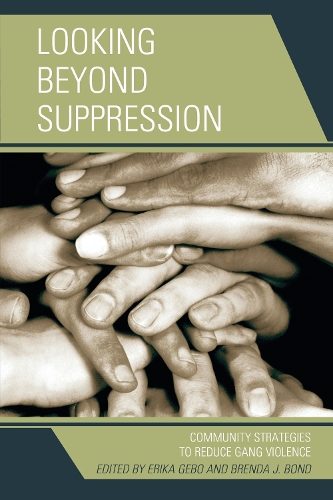
Looking Beyond Suppression: Community Strategies to Reduce Gang Violence
(Paperback)
Publishing Details
Looking Beyond Suppression: Community Strategies to Reduce Gang Violence
By (Author) Erika Gebo
Edited by Brenda J. Bond-Fortier
Contributions by Carolyn Boyes-Watson
Contributions by Anthony A. Braga
Contributions by Ellen Foley
Contributions by David M. Hureau
Contributions by Jack McDevitt
Contributions by Erin McLaughlin
Contributions by Nicole Rivers-Kustanovitz
Contributions by Laurie Ross
Bloomsbury Publishing PLC
Lexington Books
6th December 2013
United States
Classifications
Professional and Scholarly
Non Fiction
Urban communities / city life
Causes and prevention of crime
364.4
Physical Properties
Paperback
202
Width 153mm, Height 229mm, Spine 13mm
327g
Description
This edited book significantly contributes to the knowledge on how to address gang problems from a broad community perspective, which takes into account criminal justice agencies, social service providers, and community leaders, along with police, who have implemented collaborative anti-gang policies and practices. As community-wide efforts become more common, it is increasingly important to investigate effective strategies to address social problems. Beyond Suppression: Community Strategies to Reduce Gang Violence explores a demonstration project of one states efforts to reduce gang and youth violence through use of a comprehensive initiative, the Comprehensive Gang Model (CGM). The relevance of the CGM as a conceptual framework to guide gang policy and practice is illustrated throughout the book, and tailored gang reduction strategies derived from that framework and rooted in the ecological constitution of communities are showcased. The chapters highlight implementation strategies employed by various communities using a case study methodology that assists in garnering an in-depth perspective of implementation issues and key dimensions of the CGM. This book answers important questions about how communities operationalize the CGM. The results of these investigations are important for scholars, learners, and practitioners who seek to address gang violence using a customized response.
Reviews
Looking Beyond Suppression is an important and much needed book. The chapters in this edited collection report on the results of a state-led effort in Massachusetts to address gang violence in several local communities, and describe the diverse efforts in six communities to use data driven, collaborative efforts to address gang violence. Gebo and Bond have done an excellent job providing a context for the separate site descriptions and the volume also includes a statewide evaluation of the implementation and outcome of the Comprehensive Gang Model. This book is a must read for practitioners, communities, and researchers who want to better understand the challenges and opportunities in responding to gang violence and may be involved in such efforts. -- Scott H. Decker, University of Missouri
This book tells the remarkable story of a multi-city initiative across 41 Massachusetts cities and towns to address street gang activity using the Comprehensive Gang Prevention, Intervention, and Suppression Model. It vividly details how neighborhood, community, and state organizations worked together to combat gangs in a collective and balanced manner. It is a must read for researchers, practitioners, and policy makers alike. -- James C. Howell, Senior Research Associate, National Youth Gang Center
First, every chapter in this book notes the dynamic nature of gangs. They are constantly changing in their composition and activities, and frequently in conflict-laden relationships with other gangs and authorities. In chapter 4, Erika Gebo relay one participating citys effort in developing and implementing a gang assessment instrument (GAI) to gauge the level of risk for gang membership on a continuum from at risk to hardcore gang members. This exercise uncovered more divergence than expected in community stakeholders interpretation of instrument items and results * Criminal Law and Criminal Justice Books *
Author Bio
Erika Gebo is assistant professor of sociology at Suffolk University.
Brenda J. Bond is associate professor in the Department of Public Management at Suffolk University.
